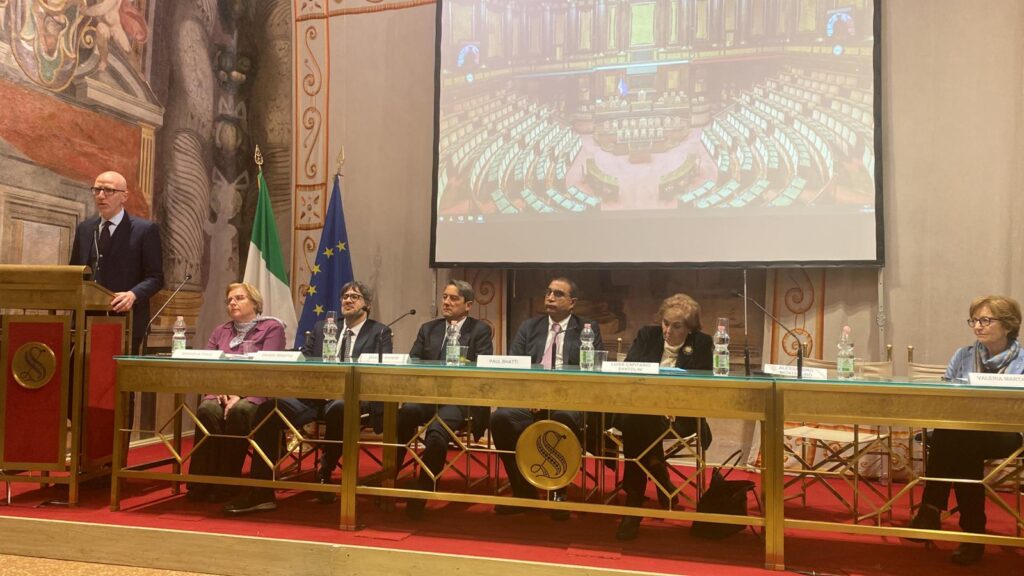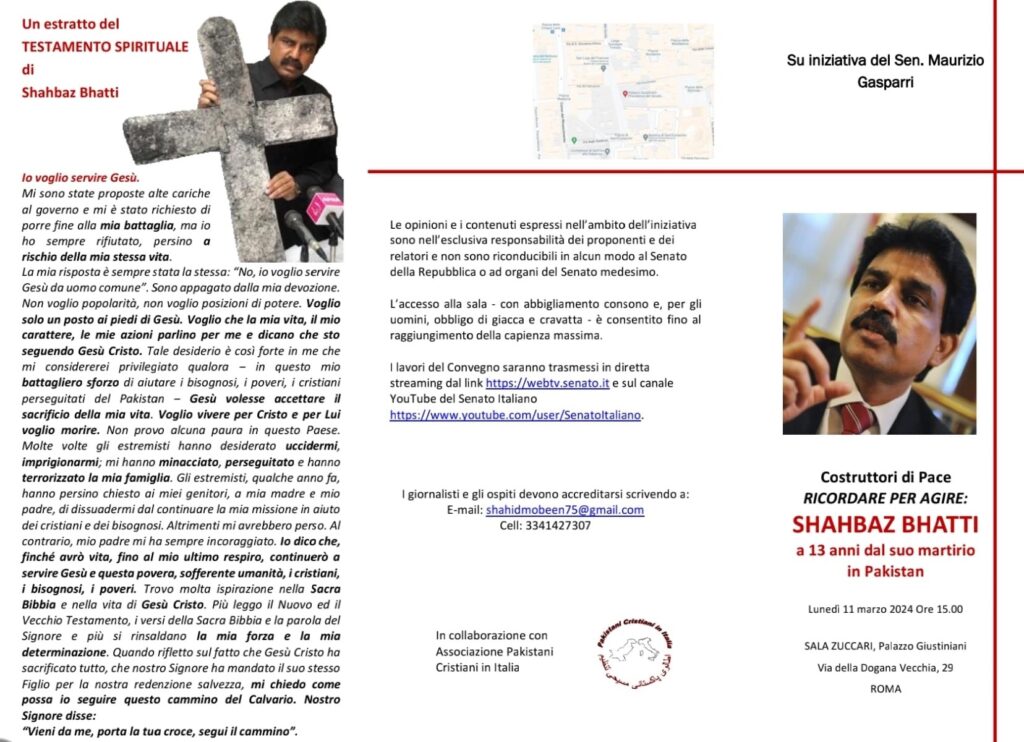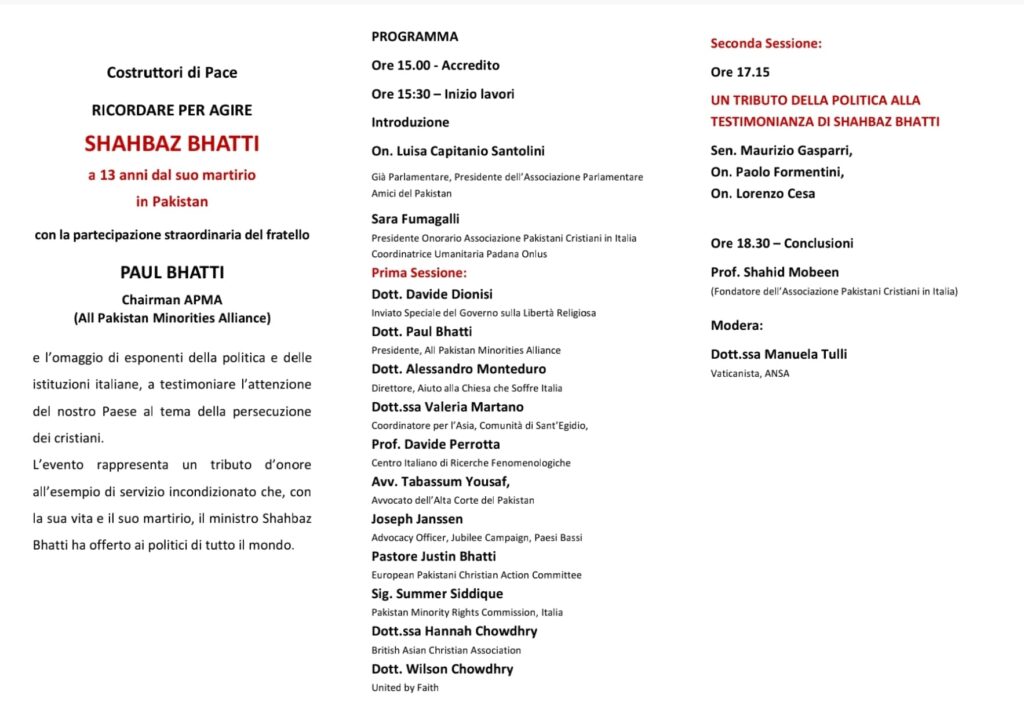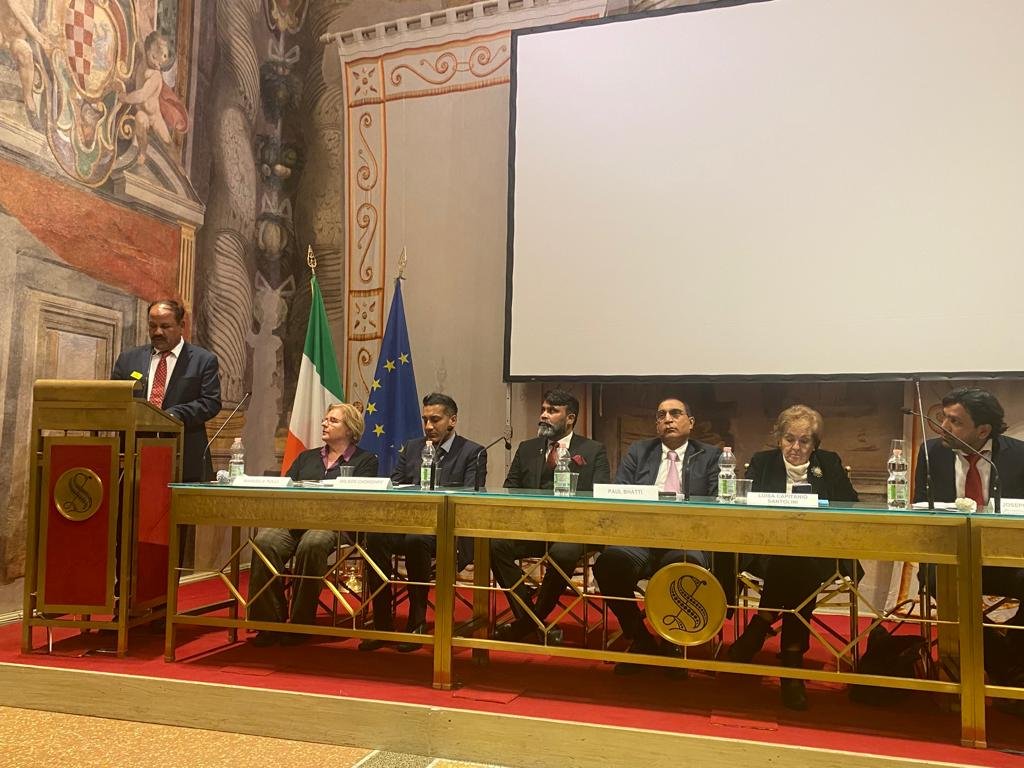Thirteen Years After Assassination, Shahbaz Bhatti Remembered as a Champion of Peace and Minority Rights
[ad_1]
Thirteen years after the tragic assassination of Shahbaz Bhatti (click here), the former Minister of Minorities in Pakistan, his legacy continues to inspire a global community committed to peace and religious freedom. In the aftermath of his tragic death, the British Asian Christian Association spearheaded the United Kingdom’s multi-faith response initially organizing a meeting with High Commissioner for Pakistan Wajid Shamsul-Haq, in March 2011. [Click here] for more information.
The profound emotions stirred by his violent murder culminated in several peace rallies (click here), a significant peace concert at Trafalgar Square (click here), a packed candle-light vigil at Westminster Cathedral (click here) as well as the creation of a viral pop song ‘His Blood Cries Out’ by the Catholic band Ooberfuse (click here), a video was made in collaboration with BACA:
The meeting held yesterday (11th March 2024), organized by the Association of Pakistani Christians in Italy, aimed to commemorate Shahbaz Bhatti, who dedicated his life as a Catholic to fostering peace among religions and cultures. As a Pakistani citizen, he advocated for equal citizenship, particularly reaching out to persecuted Christians and marginalized religious minorities. His tangible contributions included negotiations with state stakeholders to uplift the most marginalized sectors of society, where he embodied the principles of Christ through his words and actions.
Several Italian organizations and activists from Pakistani Christian organizations in Italy, the Netherlands, and the UK participated in the conference. Italian Senators and MPs attentively listened to the speakers, underscoring the event’s significance.
Jewish friends residing in Rome and Trieste showed solidarity with the religious minorities of Pakistan, recognizing the importance of their presence as there are officially still 822 Pakistani Jewish voters.
Representatives of the Pakistani Muslim community from Rome joined the event to commemorate the late Federal Minister of Pakistan, Shahbaz Bhatti, and to demonstrate their solidarity with Christians.
In a poignant address, Mobeen, now a professor at the Urbaniana University in Rome, reflected on Bhatti’s unwavering dedication to defending Asia Bibi and other persecuted minorities. “Shahbaz’s loss made us suffer, we miss him,” Mobeen stated, “but the message that was perceived nationally, in Pakistan, and even internationally, reduced the suffering because his sacrifice was not in vain.”

Throughout the event, speakers echoed the sentiment that Bhatti was not just a politician but a true peacemaker who tirelessly advocated for the rights of Christians and other marginalized communities in Pakistan. Alessandro Monteduro, Director of the Pontifical foundation, Aid to the Church in Need, emphasized the profound impact of Bhatti’s martyrdom on Christian communities worldwide, underscoring the importance of his legacy in advancing the cause of religious freedom.
Valeria Martano, coordinator for Asia of the Community of Sant’Egidio, highlighted the tangible progress made in Pakistan as a result of Bhatti’s advocacy, citing the establishment of new rights for minorities and the preservation of his Bible at San Bartolomeo all’Isola Tiberina, a symbol of martyrdom.
Tabassum Yousaf, a lawyer at the Pakistan High Court, provided a firsthand account of the ongoing challenges faced by religious minorities in Pakistan, particularly Christian girls who are victims of abduction and forced conversion to Islam.
Wilson Chowdhry, Chairman of United by Faith, a UK-based group dedicated to uniting Christians from diverse backgrounds for shared concerns (click here), recounted two meetings he had with Shahbaz Bhatti, the last occurring approximately a year before Bhatti’s assassination. Reflecting on these encounters, Chowdhry remarked:
“In my interactions with Shahbaz Bhatti, I couldn’t ignore the disparity between his public support for the Pakistani government and his candid discussions behind closed doors. It wasn’t until a posthumous video was released following his brutal assassination that the true extent of the death threats he faced became apparent. I can scarcely comprehend the immense pressure he endured, yet I commend his remarkable courage and statesmanship, which empowered him to bring about lasting change in minority rights.”
Mr. Chowdhry, compelled people to do more to make Pakistan equitable for all, he said: ‘Pakistan still bears significant responsibility for its human rights record, particularly concerning the draconian blasphemy laws that continue to devastate the lives of countless innocents, spanning across religious and ethnic lines.
The fight for the repeal of these laws must remain a paramount concern.’
Davide Dionisi, special envoy for the promotion of religious freedom appointed by Foreign Minister Antonio Tajani, reaffirmed the government’s commitment to upholding Bhatti’s legacy, condemning violence and fanaticism while urging against indifference.
Prof. Mobeen underlined ‘the need to build peace through the meeting of human beings in the common home which is our earth as loved ones of God’. He said: ‘As Christians, we are people of peace and following Christ we proclaim the Good News to all creatures as our Mission’.
At the end of the event, an extract from Shahbaz Bhatti’s spiritual testament was read by Prof Mobeen, Sr. Rifat, Fr. Shahzad, and Fr. Kashif.

Hannah Chowdhry, a law student at Aberdeen University and volunteer for the British Asian Christian Association, had been scheduled to deliver a speech at the event. Unfortunately, the event was rescheduled to take place a week earlier, and both Hannah and her father, Wilson Chowdhry, were informed of this change only the night before the event. Due to her university commitments, Hannah could not adjust her travel plans in time. Consequently, Mr. Chowdhry was approached to provide a statement, which we will share in full after this post.

At the end of the event, Mr. Chowdhry reflected on Shahbaz Bhatti’s commitment to safeguarding all minorities, including the hidden Jewish minority in Pakistan. During conversations with delegates at the event, Mr. Chowdhry stated, “Mr. Bhatti was a staunch proponent of peace and safety for all. It would be disheartening for him to witness the rise of antisemitism in the West.” He further noted, “Bhatti was an outspoken advocate for the Jewish minority in Pakistan and continues to be revered by them.” Mr. Chowdhry also mentioned his assistance to Fishel Benkald, who changed his identity from Muslim to Jew after a prolonged campaign (click here). He emphasized that this effort was a continuation of Shahbaz Bhatti’s early work, which brought attention to Benkald’s case. Additionally, he underscored the necessity for individuals of good conscience to advocate for all the oppressed, irrespective of popularity or personal identification. He emphasized that only by doing so can we truly emulate Shahbaz’s exemplary character.
Joel Kyari, a Trustee for the British Asian Christian Association, remarked:
“The assassination of Shahbaz Bhatti served as a wake-up call to the entire world. It serves as a stark reminder of the injustices that can plague society if we remain silent in the face of evil. His life and martyrdom have become catalysts for change, inspiring numerous humanitarians. I firmly believe that his legacy will one day contribute to transforming Pakistan into a nation where equality and justice prevail.”
A link to a recording of the entire meeting can be found (here).
Below is the proposed content of Hannah’s speech that she was unable to deliver due to the change in the meeting date:
Ladies and gentlemen,
I am deeply honoured to address this esteemed gathering, recognizing the significance it holds for people across the globe. While the sacrifices of Shahbaz Bhatti, which ultimately led to his martyrdom, are widely acknowledged, I refrain from delving into the details, presuming many here are already well acquainted with his story.
However, the enduring impact of his life reverberates as a lasting legacy. Allow me to share a personal reflection: I am 20 years old, merely 7 at the time of Bhatti’s tragic assassination. In an obituary penned by Benedict Rogers, a prominent human rights activist, he recounted a poignant moment with Shahbaz, aiding a seven-year-old Christian girl who had endured unimaginable trauma during a brutal sexual assault. Bhatti’s unwavering commitment to help her and her family, despite the apathy of others, deeply resonates with me as a young woman.
His passing captured international attention, drawing condolences from unexpected quarters, including former U.S. President Barack Obama, who expressed profound sorrow, acknowledging Bhatti’s sacrifice for the fundamental freedom of religious practice.
The Vatican denounced the attack as a “terribly grave act of violence,” echoing sentiments echoed by U.N. Secretary-General Ban Ki-moon. This remarkable global solidarity, typically reserved for heads of state, underscores the exceptional nature of Bhatti’s character.
Indeed, Shahbaz Bhatti was a trailblazer, breaking barriers as the first and only Christian to hold a cabinet-level position in Pakistan’s Federal Ministry, serving as Minister for Minorities. His tenure witnessed the establishment of a ministry dedicated to restoring the rights of religious minorities and fostering tolerance.
Among his notable achievements were the introduction of a 5% minorities quota in government employment, the creation of minority seats in the Senate, and the establishment of a 24-hour minorities helpline. Despite facing death threats and state intimidation, Bhatti remained undeterred, engaging in prison visits, aid distribution, and advocating for political and legal reforms.
His haunting video, released posthumously, wherein he confronted the spectre of Islamist extremism and his personal fears, brought into sharp focus the plight of Christian persecution in Pakistan, resonating with people worldwide.
Today, a surge in NGO activities in Pakistan and advancements in gender rights legislation bear testament to the enduring influence of Shahbaz Bhatti’s work. However, his ultimate aspiration of repealing Pakistan’s blasphemy laws remains unfulfilled, a torch now carried by the next generation. I fervently pray for the realization of this goal, not just in honour of Bhatti’s memory, but for the restoration of peace in a fractured nation.






